Why Lithium Can Turn Dangerous With Common Medications
Lithium has been helping people manage bipolar disorder for over 50 years. But it’s not a safe drug to take lightly. Even small changes in your body or what you’re taking can push lithium levels into the danger zone. The difference between working well and causing serious harm is tiny - just 0.6 to 1.2 mmol/L in your blood. Go above that, and you risk toxicity: nausea, shaking, confusion, even seizures. And it’s not just about taking too much lithium. The real danger often comes from things you wouldn’t think are connected - like ibuprofen, water pills, or not drinking enough water.
How NSAIDs Push Lithium Levels Up
Non-steroidal anti-inflammatory drugs - think ibuprofen, naproxen, diclofenac - are among the most common culprits. They’re in painkillers, cold meds, and even some arthritis treatments. What most people don’t know is that these drugs reduce how well your kidneys clear lithium from your body. It’s not magic. It’s science: NSAIDs block prostaglandins, which help your kidneys filter blood. Less filtration means lithium builds up.
Studies show that after just a few days of taking an NSAID, lithium levels can jump by 25% to 60%. Indomethacin is the worst offender - it can spike levels by up to 60%. Ibuprofen? Around 30%. Even celecoxib, marketed as safer, still pushes levels up by 15-30%. The effect hits fastest in older adults or those already with kidney issues. One fatal case in New Zealand involved a 72-year-old woman on lithium and an ACE inhibitor who took an NSAID for back pain. Her lithium levels climbed unnoticed. She died from toxicity.
It’s not just long-term use. Even a single week of ibuprofen for a headache can be enough. That’s why doctors tell patients: if you need pain relief while on lithium, talk to your prescriber first. Acetaminophen (paracetamol) is usually the safer choice - no known interaction.
Diuretics Are a Hidden Threat
Diuretics - water pills - are prescribed for high blood pressure, heart failure, or swelling. But not all diuretics act the same with lithium. Thiazides like hydrochlorothiazide are the biggest problem. They can raise lithium levels by 25% to 50% in just 7 to 10 days. That’s because they reduce sodium in your urine, and your kidneys respond by holding onto more lithium instead.
Loop diuretics like furosemide are less risky, but still dangerous. They can raise lithium levels by 10-25%, especially if you’re dehydrated. And then there are the odd ones out: osmotic diuretics like mannitol and carbonic anhydrase inhibitors like acetazolamide actually lower lithium levels - by 15-30%. That’s a different kind of risk. Too little lithium means your mood can swing back out of control.
Even herbal diuretics - those “natural” weight-loss teas or supplements - can be deadly. They’re not regulated, and they often cause dehydration. That’s enough to push lithium into toxic range. One patient in a case report took a “detox” tea while on lithium. Within days, she was vomiting, trembling, and confused. Her lithium level was over 2.5 mmol/L - more than double the safe limit.
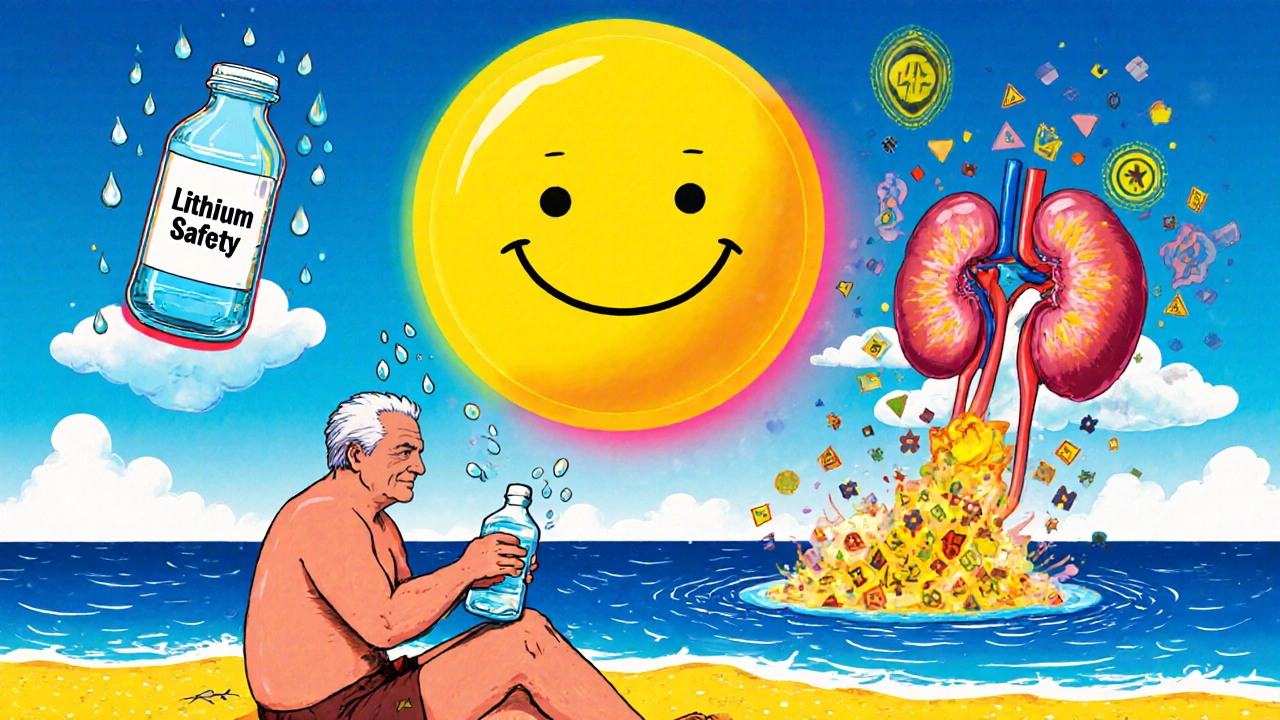
Dehydration: The Silent Amplifier
Here’s the thing: lithium doesn’t care if you’re sweating, sick, flying, or just skipping your morning glass of water. Your body holds onto lithium based on how much fluid and salt you have. When you lose water - from fever, diarrhea, exercise, or just not drinking enough - your blood gets thicker. Lithium gets concentrated. A 2-3% drop in body water can raise lithium levels by 15-25%.
That’s why travel is risky. Flying long-haul, especially in dry cabins, causes dehydration. So does heat. A patient in Bristol who took lithium and went on a beach holiday without drinking extra water ended up in the hospital with tremors and blurred vision. Her levels had jumped after just three days in the sun.
Salt matters too. If you suddenly eat less salt - say, you start a low-sodium diet - your kidneys hold onto more lithium. That can raise levels by 10-20%. On the flip side, eating more salt can lower lithium levels, which might make your mood unstable. The key? Keep your salt and fluid intake steady. Don’t cut salt to “be healthy” without talking to your doctor. And drink water regularly, even if you’re not thirsty.
Who’s at Highest Risk?
Not everyone on lithium is equally vulnerable. Some groups face much higher danger:
- People over 65: Their kidneys don’t filter as well. They’re 3.2 times more likely to develop lithium toxicity.
- Those with kidney disease: Even mild impairment cuts lithium clearance in half.
- People with heart failure: Fluid retention and medications like diuretics and ACE inhibitors stack the risk.
- Those on multiple interacting drugs: Combining NSAIDs, diuretics, and SSRIs like fluoxetine multiplies the danger.
One study found that over half of lithium toxicity cases happened in patients over 65 with at least two risk factors. That’s why regular blood tests aren’t optional - they’re life-saving.
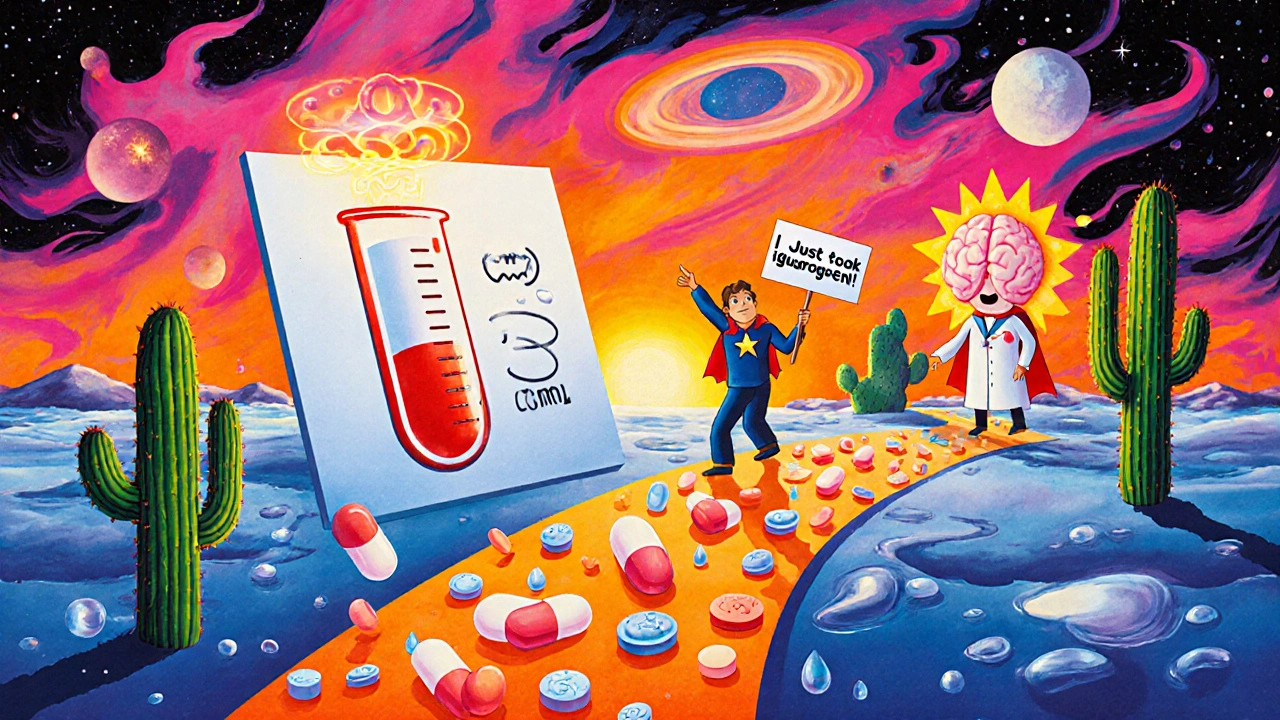
What You Must Do to Stay Safe
If you’re on lithium, here’s what you need to do - no exceptions:
- Never start an NSAID without telling your doctor. Even a 3-day course of ibuprofen needs approval.
- Get your lithium levels checked within 7-10 days after starting any new medication - especially diuretics or NSAIDs.
- Check levels again after 2 weeks if you’re on a long-term diuretic.
- Drink water daily. Aim for 1.5-2 liters unless your doctor says otherwise. Keep a bottle with you.
- Don’t change your salt intake. Avoid low-sodium diets unless medically necessary and supervised.
- Watch for early signs of toxicity: Diarrhea, nausea, shaky hands, dizziness, frequent urination, or confusion. If you feel off, get tested - don’t wait.
- Avoid herbal diuretics and detox teas. They’re not safe, even if they say “natural.”
Some patients are put on a lower dose of lithium if they need to take an NSAID or diuretic long-term. That’s not a compromise - it’s standard care. Your doctor should coordinate with a kidney specialist if you have multiple risk factors.
What Happens If You Ignore the Warnings?
Too many people don’t realize how fast things can go wrong. Lithium toxicity doesn’t always come with a warning. One patient in the UK took ibuprofen for a headache, didn’t drink extra water, and didn’t get tested. Three days later, she was in intensive care with seizures. Her kidneys were damaged - permanently. She recovered, but her lithium dose had to be cut by 40%, and she now needs monthly blood tests.
Another case involved a man who took a “natural” diuretic for bloating. He didn’t tell his psychiatrist. His lithium level hit 2.8 mmol/L. He lost coordination, couldn’t speak clearly, and spent a week in hospital. His kidneys were fine, but his mood crashed for months afterward.
These aren’t rare. They’re preventable. And they happen because people assume: “It’s just a painkiller,” or “I’m fine, I’ve been on lithium for years.” But lithium doesn’t care how long you’ve been on it. It only cares about what’s in your blood right now.
Final Reality Check
Lithium is one of the most effective mood stabilizers we have. But it’s also one of the most fragile. It doesn’t take much to tip the balance. NSAIDs, diuretics, dehydration - these aren’t just “side effects.” They’re direct threats to your safety.
You don’t need to stop taking your meds. You don’t need to live in fear. But you do need to be informed. Talk to your doctor before taking anything new. Keep a list of all your medications - including supplements. Drink water. Track your salt. Know the early signs of trouble. And never skip a blood test.
Your brain depends on lithium working just right. Don’t let something as simple as an ibuprofen tablet or a hot day undo all the progress you’ve made.
Can I take ibuprofen while on lithium?
You should avoid ibuprofen if possible. It can raise lithium levels by 25-40% within days, increasing the risk of toxicity. If you need pain relief, ask your doctor about acetaminophen (paracetamol), which doesn’t interact with lithium. If ibuprofen is absolutely necessary, your lithium level must be checked within 7 days of starting it and again after 2 weeks.
Are all diuretics dangerous with lithium?
No, but some are far riskier. Thiazide diuretics like hydrochlorothiazide are the most dangerous - they can spike lithium levels by up to 50%. Loop diuretics like furosemide carry a lower but still real risk. Osmotic diuretics (mannitol) and carbonic anhydrase inhibitors (acetazolamide) actually lower lithium levels. Always check with your doctor before starting any diuretic.
How much water should I drink on lithium?
Aim for 1.5 to 2 liters of water per day, unless your doctor advises otherwise. In hot weather, during illness, or after exercise, drink extra. Even mild dehydration - losing just 2-3% of your body weight in water - can raise lithium levels by 15-25%. Don’t wait until you’re thirsty.
Does salt intake affect lithium levels?
Yes, significantly. Eating less salt causes your kidneys to hold onto more lithium, raising your blood levels. Eating more salt lowers them. A change of 20-30 mmol of sodium per day can shift lithium levels by 10-20%. Don’t start a low-salt diet without talking to your doctor. Keep your salt intake consistent.
How often should lithium levels be checked?
When you first start lithium, levels are checked weekly for the first month. After that, every 3-6 months is typical - unless something changes. If you start a new medication like an NSAID or diuretic, check levels within 7-10 days and again at 2 weeks. Older adults or those with kidney issues may need monthly checks.
Can lithium toxicity cause permanent damage?
Yes. Severe lithium toxicity can damage the kidneys, sometimes permanently - especially in older adults or those with pre-existing kidney problems. It can also affect the brain, causing tremors, memory issues, or coordination problems that don’t fully go away. Early detection and treatment are critical to prevent lasting harm.
Are herbal diuretics safe with lithium?
No. Herbal diuretics - found in weight-loss teas, detox supplements, or “natural” remedies - are not regulated and can cause dangerous lithium spikes. They often work by dehydrating you, which concentrates lithium in your blood. Even small amounts can lead to toxicity. Avoid them completely while on lithium.
What should I do if I feel unwell on lithium?
If you experience diarrhea, nausea, shaking, dizziness, confusion, blurred vision, or ringing in the ears, stop taking any new medications and contact your doctor immediately. These are early signs of lithium toxicity. Get a blood test right away. Don’t wait to see if it gets better - lithium toxicity can worsen quickly.
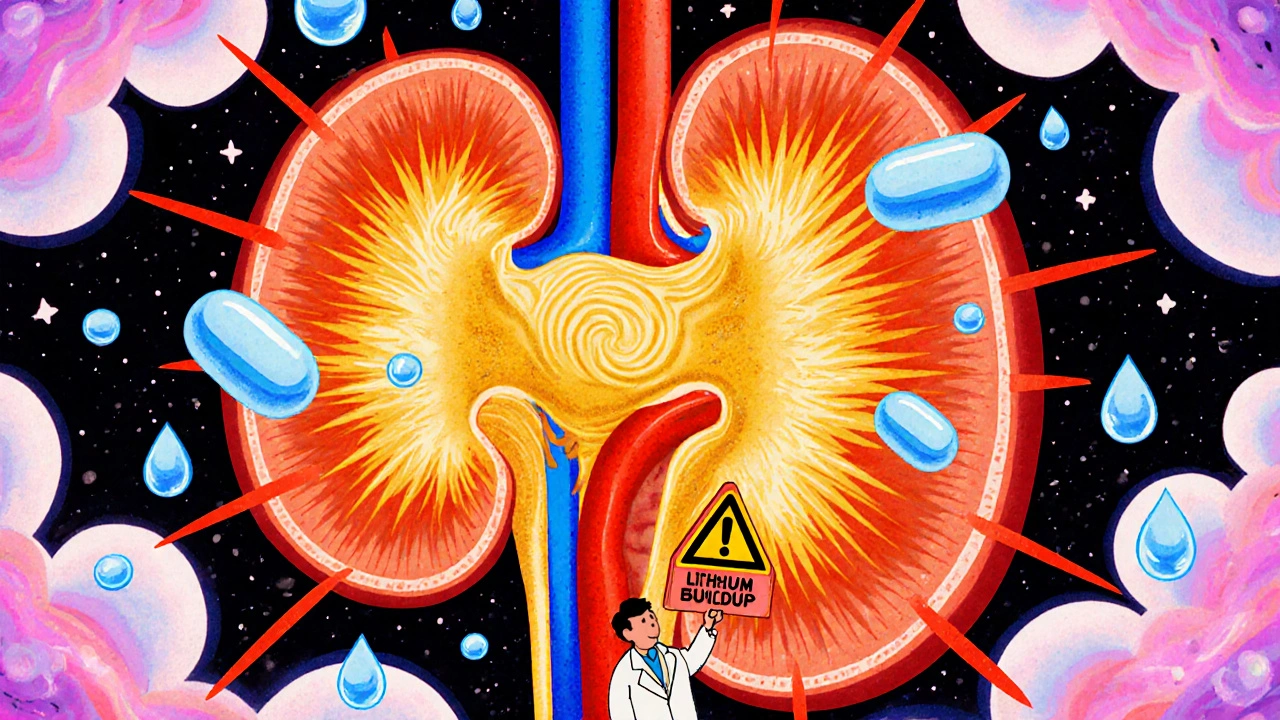

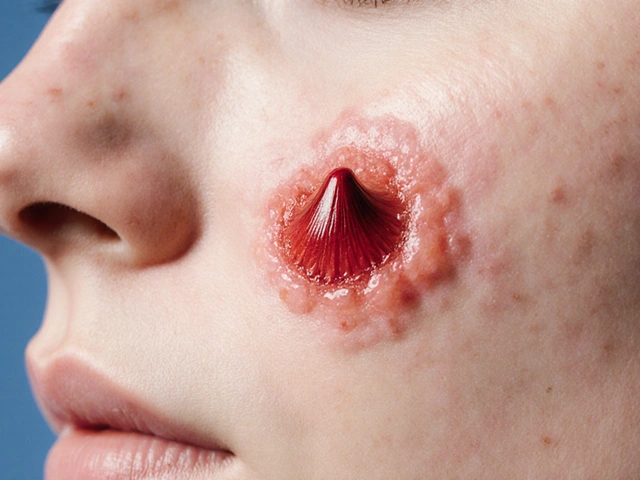
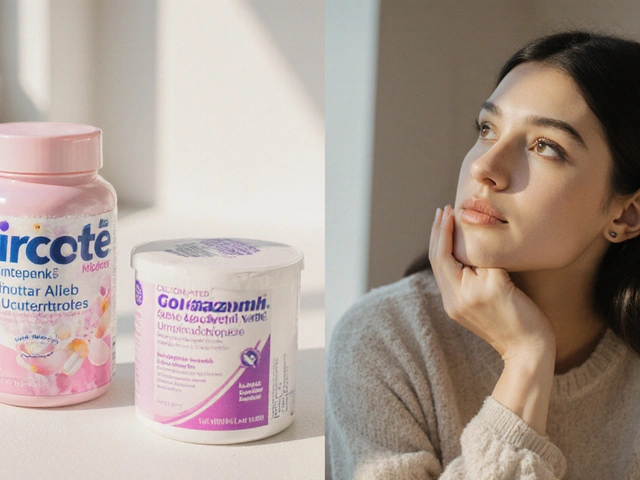
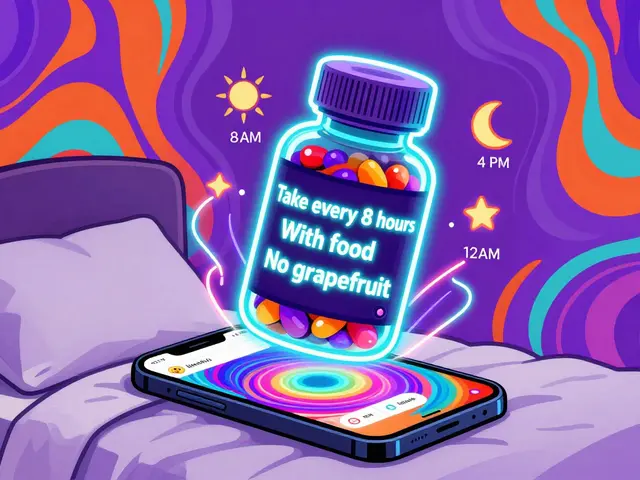
Brian Bell
November 14, 2025 AT 09:25Scott Saleska
November 15, 2025 AT 13:21Ashley Durance
November 17, 2025 AT 05:16Ryan Anderson
November 18, 2025 AT 14:31Eleanora Keene
November 19, 2025 AT 21:53Don Ablett
November 21, 2025 AT 20:09Joe Goodrow
November 23, 2025 AT 02:24Kevin Wagner
November 23, 2025 AT 23:54Dilip Patel
November 25, 2025 AT 10:55Jane Johnson
November 27, 2025 AT 06:34Brian Bell
November 28, 2025 AT 07:20Peter Aultman
November 28, 2025 AT 18:32Sean Hwang
November 29, 2025 AT 23:22Barry Sanders
December 1, 2025 AT 00:25